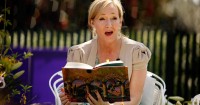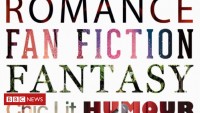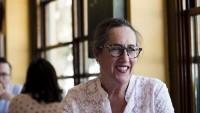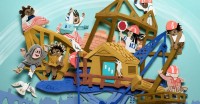
J.K. Rowling ‘can’t stand’ following rules—here’s what she says to do instead if you want to succeed
cnbc.com – Monday January 21, 2019

J.K. Rowling, author of the “Harry Potter” series and the Cormoran Strike mysteries, has sold over 500 million books. She was the second highest-paid author of 2018, managing to earn an astounding $54 million.
Famously, though, Rowling started out as a single mother surviving on state benefits. “I was jobless, a lone parent and as poor as it is possible to be in modern Britain without being homeless,” she said in her 2008 Harvard commencement speech.
Rowling, now 53, didn’t turn her life around and get where she is today by abiding by conventional wisdom.

5 Tips for Submitting Creative Writing
culturedvultures.com – Saturday January 12, 2019

A lot of people make New Year’s Resolutions to write more, and some even decide that they are going to submit for publication. Each type of writing has its own rules and norms when it comes to submitting to magazines and websites, but the more you practice, the better you will get at it. Here are our top five general tips for submitting creative writing and poetry – these apply to our Short Stories department here at Cultured Vultures, but they will also set you up for sending your work to all sorts of places.

5 Tips For Young And Emerging Writers
wamu.org – Thursday January 3, 2019

Writers: how often have you been told to “write what you know”?
Generic writing advice is so often repeated it’s become a joke in the New Yorker. But do young or emerging writers feel boxed-in when they hear the same lessons over and over again that prioritize certain kinds of writing styles? Today on The Kojo Nnamdi Show, we’ll explore what it takes to write fiction, and what resources the Washington region has for new writers. One of our guests, Zachary Clark, leads 826DC, a nonprofit chapter that provides writing support to young Washingtonians.
Check out Zachary’s writing advice, and leave your own in the comments section!

Happy Verbs
By G. Miki Hayden
Instructor at Writer's Digest University online and private writing coach
firstwriter.com – Thursday December 27, 2018

Well, I don’t think the verbs are actually happy. I only said that to attract your attention. But verbs do have moods. And I used the word “moods” to draw your attention, too. But it’s true that verbs have moods, though we also call them modes.

How to write your own auto-fiction book
harpersbazaar.com – Monday December 17, 2018

Everyone likes to think they've got a book in them (and, in many cases, that's notwhere it should stay), but the practical act of writing one is another story. Often, you might have had some experience which has made you want to put pen to paper, but perhaps you don't fancy a tell-all memoir that everyone you know will read. Enter auto-fiction, the not-so-new style of writing gaining serious traction in literary circles.

Paragraphing—Yes, You Heard Me
By G. Miki Hayden
Instructor at Writer's Digest University online and private writing coach
firstwriter.com – Wednesday December 12, 2018

I wouldn’t think paragraphing could be a mysterious business, but apparently so.
I wish I had an electronic rubber stamp that said, “Break your paragraphs”, because writers need to do exactly that. My students, in particular, need to do just that.

Nine things not to do if you want to write/paint/create
smh.com.au – Sunday December 2, 2018

A decade ago this week the Sydney Opera House architect Jorn Utzon died. I was on the other side of the world when this happened, living in San Francisco driving across the Golden Gate Bridge when his obituary was read out on the BBC World Service. Listening to this Dane’s extraordinary story about the building he dreamt up but never saw complete, I knew this most Sydney of stories would make a great book. By the next month I had pitched the idea to a publisher and spent the best part of the next decade wrestling to find the time to research and write it.
A lot happened in my personal life over those 10 years. But I also spent a lot of time procrastinating. So I dreamt up some tips, from my own hard-wrought experience about what NOT to do if you want to write a book, or indeed undertake any creative endeavour. If the fire burns in your belly for such an undertaking (which is a core ingredient to success) you might find them helpful.

The app that makes writing less lonely
bbc.co.uk – Monday November 26, 2018

If you see a writer in a movie, most likely she (or he) will be tapping on a laptop. But many young writers are doing it on mobile phones, and sometimes in teams.
Daniel, who uses the pen name LisVender, begins the story, which his writing team decides to call A Small Case of Writer's Block.
The tapping of Sara's pen against her glasses became so rhythmic that it sounded like a metronome set to allegretto. She spun in her swivel chair, watching the bookcases in her study swing by. She had to admit it: her story was stuck, her characters were stuck, and so was she.
Ella, pen name Elle, who has 313 stories under her belt, then picks up the tale.
Sighing, she slumped forward, forehead hitting the desk with a thump. How was she going to keep the plot rolling forward, give her characters the development they needed? Her eyes swivelled to the window, the glass frosted over with thin ice. Maybe a walk outside in the cold
At 276 characters, Elle has nearly reached her 280 limit, so she stops mid-sentence and passes the story to the next writer. (You can read the rest of the story at the bottom of this page.)
Welcome to the world of Inkvite, one of a number of creative-writing platforms popular with teenagers and young adults in the US. It allows users to share stories, comment on them, and also collaborate.
Here, five Inkvite authors explain its appeal.

Going with gut instinct: Lunch With literary agent Fiona Inglis
smh.com.au – Friday November 16, 2018

By the end of an opening chapter, Fiona Inglis usually has a good idea if the manuscript in her hands is potential bestseller material.
Call it gut instinct, says the well-connected head of the literary agency Curtis Brown who has made a career out of spotting writers readers want to read and counts bestselling clients Liane Moriarty, Markus Zusak, Andy Griffiths and Thomas Keneally as friends.
Story is everything. "Good writing will always rise to the top because it has something to say that is worth paying attention to," Inglis says. "I know immediately when I've found something fabulous because I want to interrupt everyone in the office and say, 'You have to read this!'

The Radicalization of Bedtime Stories
theatlantic.com – Monday November 12, 2018

More than 200 years ago, when books for children first became common, they delivered simple moral lessons about, for instance, cleanliness and the importance of prayer. Today, story time is still propelled by moral forces, but the issues have gotten a good deal more sophisticated.
In recent years, publishers have put out children’s books with political undertones and activist calls to action on topics ranging from Islamophobia to race to gender identity to feminism. “The trend has definitely exploded in recent years with the social-justice books and the activism books,” says Claire Kirch, a senior correspondent at Publishers Weekly who has been covering the book industry for 15 years.
Get the free newsletter | Submit a news item or article | Get Writers' News for your website





